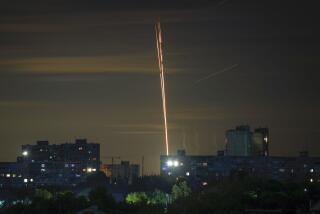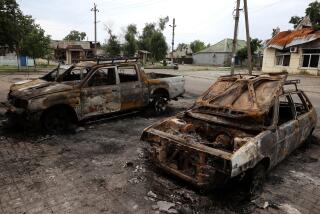Britain deals a setback to U.S.
- Share via
DUBLIN, IRELAND — In a major diplomatic defeat for the U.S., Britain broke ranks Wednesday and joined more than 100 nations in agreeing in principle to an international ban on cluster bombs, the small, insidious weapons that have killed thousands of civilians in the aftermath of battle.
Though the Bush administration has lobbied hard against the treaty and many U.S. and British officials consider cluster bombs valuable weapons, British Prime Minister Gordon Brown overruled elements of his own military and threw his support behind the prohibition. Brown’s decision cleared the way for an agreement that supporters said would lead to the removal of cluster munitions from arsenals around the world.
The pact, to be formally endorsed Friday by the nations gathered in Dublin for negotiations and signed in December, creates a new international convention prohibiting the use, production, stockpiling and transfer of cluster munitions. It requires nations that conduct joint military operations with countries not party to the agreement to actively discourage use of the weapons.
The immediate impact of the draft agreement is limited because none of the major producers and users of cluster munitions, including the U.S., Russia and China, are participating. Russia has said it would not support an international ban.
But advocates have said they believe the pact will result in sufficient international pressure to prevent any nation from deploying the weapons.
“From our perspective, this is quite an amazing result. Only a year and a half ago, countries would have said you were mad to think the world could turn around and ban cluster munitions with an international treaty, but what we’ve achieved here in Dublin is exactly that,” said Thomas Nash, international coordinator for the Cluster Munition Coalition, a network of about 200 organizations promoting the ban.
Momentum for a comprehensive ban similar to that adopted for land mines in 1997 grew after the 2006 war in Lebanon, when Israel deployed large quantities of cluster munitions, which release a spray of more than 200 small, harmless-looking bomblets that often don’t explode until long after a conflict is over.
International investigators said that at least 200 civilians were killed or injured in Lebanon as a result of cluster bombs after the war. Thousands of other deaths and injuries have been recorded in Kosovo, Kuwait, Chechnya, Iraq, Southeast Asia and elsewhere.
--
Turnabout was key
Advocates of the ban said Britain’s turnabout Wednesday broke open the doors and led to several other nations’ dropping significant objections to the agreement.
“In order to secure as strong a convention as possible in the last hours of negotiation, we have issued instructions that we should support a ban on all cluster bombs, including those currently in service by the U.K.,” Brown said in a statement in London.
Brown said Britain would deploy its diplomatic efforts to ensure the “widest possible international support” for the new agreement.
“The whole tenor of the negotiations just abruptly changed when the U.K. made their statement,” said Marc Garlasco, senior military analyst for Human Rights Watch, which is working to win approval of the convention.
“This has completely and totally isolated the U.S., and represents a real failure of U.S. foreign policy. Britain has stood up to the U.S.,” Garlasco said.
U.S. officials have acknowledged there are significant humanitarian concerns over cluster munitions but have called for addressing the problem in an alternative forum that includes the countries most likely to use them, in order to achieve meaningful controls.
“We decided not to go to [an earlier conference on cluster bombs in] Oslo because we don’t want to give weight to a process that we think is ultimately flawed, because we don’t think that any international effort is going to succeed unless you get the major producers and the users of these weapons at the table,” Stephen D. Mull, acting assistant secretary of State for political-military affairs, told reporters in Washington last week at the start of the conference in Dublin, the Irish capital.
He said cluster bombs represented only a small portion of unexploded ordnance left behind in war, which also includes land mines, other kinds of bombs and grenades. Of 15,000 casualties from these kinds of unexploded weapons recorded in 2006, no more than 5% were attributable to cluster bombs, U.S. officials say.
The Bush administration is also supporting technological improvements, now legally required for U.S.-deployed and -exported weapons, which make it much more certain that cluster munitions will explode when deployed, and not later when they may come into contact with civilians.
But U.S. and British military officials and analysts have said cluster munitions remain an important part of the arsenal when it is necessary to halt hostile forces’ advance across defined territory.
“We’ve used them recently in battle, certainly in Iraq, and for the British military, if you’re facing hostile land forces, then obviously a means of dealing with them is important,” said Lawrence Freedman, professor of war studies at King’s College London and author of “A Choice of Enemies: America Confronts the Middle East.”
“With cluster bombs, they can take out a lot of your enemy at once. And they can deny and make it hard for enemy ground forces to operate.”
--
Joint maneuvers OKd
In response to U.S. lobbying outside the conference, and also concerns raised by British diplomats, the agreement does not prohibit nations party to the ban from conducting joint military operations, including North Atlantic Treaty Organization maneuvers and international peacekeeping deployments, with countries that are not, such as the U.S.
“The most important thing, I’m sure Brown would say, is to be able to work inter-operatively with the Americans. You can’t allow this to be a bar to joint operations,” Freedman said.
The agreement requires its signatories to “discourage” the use of the weapons by joint operations partners who have not participated in the agreement.
The pact also does not specifically prohibit non-treaty nations from stockpiling cluster munitions on bases they control within the territory of nations that have signed the pact. But Nash, the Cluster Munition Coalition coordinator, said advocates of the ban would work in the next few days to get signatory nations to announce unilaterally that they will not allow these foreign stockpiles.
More to Read
Sign up for Essential California
The most important California stories and recommendations in your inbox every morning.
You may occasionally receive promotional content from the Los Angeles Times.













